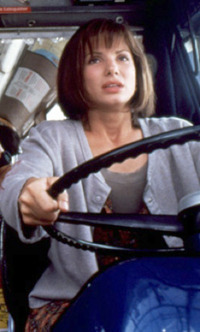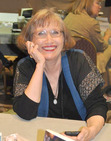Meg Benjamin's Blog, page 24
July 7, 2011
I Love You, Maybe
 I just finished rereading one of my favorite books of all time, Slightly Dangerous by Mary Balogh. There are a lot of reasons I love this book—it's the culmination of a series, this one about the Bedwyn family, and it concerns the romance of the bull goose Bedwyn, Wulfric, Duke of Bewcastle. Wulf falls in love with a woman who's totally wrong for him—wrong class, wrong temperament, wrong age, etc. But one of the things that makes this book work so well is that it's a rare story where the "he-won't-say-he-loves-me" trope actually works.
I just finished rereading one of my favorite books of all time, Slightly Dangerous by Mary Balogh. There are a lot of reasons I love this book—it's the culmination of a series, this one about the Bedwyn family, and it concerns the romance of the bull goose Bedwyn, Wulfric, Duke of Bewcastle. Wulf falls in love with a woman who's totally wrong for him—wrong class, wrong temperament, wrong age, etc. But one of the things that makes this book work so well is that it's a rare story where the "he-won't-say-he-loves-me" trope actually works.
You know the trope I mean, of course. It's the plot where the heroine works herself into a lather because the hero won't tell her he loves her. If it's a Regency romance, the heroine sometimes refuses to marry the hero until she's somehow assured of his love, preferably by some high-flown announcement of the same.
The reason I frequently find this plot so annoying is that it doesn't take into account the way most people think: we look at actions rather than words. If a politician tells me he just loves little kiddies and that children are the future, etc. and then cuts education funding to the bone and beyond, I'm going to assume he's a liar and a hypocrite. Similarly, if a hero is stalwart and true, treating the heroine with affection, respect and passion, what the hell does it matter whether he says he loves her or not? Only an idiot would assume he doesn't.
But in Slightly Dangerous you've got real doubts about Wulf's feelings when he first proposes to the heroine. Sure, she's a terrific woman, but he's a very flawed man. The first time he proposes, she rejects him, and you feel that she's made absolutely the right choice.
The rest of the book is devoted to bringing these two very different people together, and it's an enjoyable ride. Through the other five Bedwyn books you see Wulf develop and you know he's a decent, albeit arrogant man. But he's seldom shown much humanity, the quality he has to have in order to win Christine. At the same time, you've seen Christine's justified dislike of aristocratic society and you know that overcoming it is going to be a major hurdle. Since this is a romance, there's never any doubt Wulf will become the man Christine wants him to be or Christine will find a way to become the kind of duchess Wulf needs, but the fun comes in seeing how Balogh works the whole thing out.
I guess what it comes down to is that the heroine's he-won't-say-he-loves-me fetish needs to be justified and that justifying that trope is often tricky. Balogh manages it by making the question crucial to the denouement of the story. The heroine isn't being a dingbat here. What she's asking for is central to the couple's future happiness.
And that, I'd suggest, is rare indeed.








June 30, 2011
Inside Information
 Readers sometimes think they know writers based on what they write. Erotic romance writers are always running into readers who are certain they must be practicing the same exotic routines they describe in their books, while suspense writers sometimes have to explain that, no, they haven't really used an AK-47 lately. This kind of knowledge is rarely accurate, but if you read a lot of things written by a particular writer, you may actually begin to pick up on a few of their personal quirks.
Readers sometimes think they know writers based on what they write. Erotic romance writers are always running into readers who are certain they must be practicing the same exotic routines they describe in their books, while suspense writers sometimes have to explain that, no, they haven't really used an AK-47 lately. This kind of knowledge is rarely accurate, but if you read a lot of things written by a particular writer, you may actually begin to pick up on a few of their personal quirks.
Jennifer Crusie, for example, obviously owns pets, based on the number of them that show up in her books. Actually, this isn't much of a revelation since Crusie has admitted as much herself, but the number and kind of animals who haunt Crusie's books is also a pretty clear giveaway.
To take a detail that's a little more difficult to suss out, Jayne Anne Krentz is a tea-drinker. Most of Krentz's heroines drink tea and complain if they're expected to drink coffee. Frequently, the hero is a coffee drinker, but his willingness to adapt to the tea-drinking preferences of the heroine is a clue to his being the Right Guy. If this only happened once or twice, I might call it coincidence, but since it shows up in so many of Krentz's books, I'm betting it's based on her own preferences.
Nora Roberts, on the other hand, is either a former or current smoker. No other romance writer I know of has so many smoking heroes and heroines (and I'm not referring to their degree of hotness either), or so many reformed smoking heroes and heroines. In Roberts' earlier books, they're all still puffing away, but in her later books they're frequently trying to quit. In Angels Fall, for example, the hero is a reformed smoker who still thinks about the taste of the cigarettes he's given up, and Roberts describes that taste lovingly. QED.
The redoubtable Kerry Greenwood is either a cook or a gourmand, possibly both. You'd expect food to show up in her Corinna Chapman books since Corinna owns a bakery, but food is also lovingly described in her Phryne Fisher books, which take place during the twenties, not what you'd think of as a high time for good cooking. My guess is that Greenwood is reflecting her own preferences in both series.
So what can you tell about me from my books? I own pets, but again that's not much of a secret since I've mentioned my cats in blog posts. I love wine and margaritas, reflected in the amount of both that my characters consume. I like to cook, and good food tends to show up in my books.
All of that is very straightforward and something I'll readily admit to. But here's the thing: the stories themselves are fiction. With a few very minor exceptions (e.g., the shooting of the cat in Venus In Blue Jeans), the events themselves didn't happen to me. I've spent a lot of time in the Hill Country, but I've never lived there, never worked in a winery, and never had a sociopath try to kidnap my baby (thank the good lord!). And that's probably true for most of us who write. The details of our books we may take from life. The stories, however, we take from our own personal, sometimes perverse, imaginations.








June 23, 2011
The Screamer
 Last week the DH and I watched Knight and Day. Or rather, the DH watched it. I made it about a third of the way through, at which point I found Cameron Diaz's character so annoying that I walked out of the room. She seemed to have possibilities at first—she restored classic cars and was traveling with some vintage parts in her carry-on. But then the movie lurched into the hand-to-hand combat part of the plot (Tom Cruise is a spy, Diaz is an innocent bystander who gets swept up in his plots, yadda yadda), and I couldn't take it.
Last week the DH and I watched Knight and Day. Or rather, the DH watched it. I made it about a third of the way through, at which point I found Cameron Diaz's character so annoying that I walked out of the room. She seemed to have possibilities at first—she restored classic cars and was traveling with some vintage parts in her carry-on. But then the movie lurched into the hand-to-hand combat part of the plot (Tom Cruise is a spy, Diaz is an innocent bystander who gets swept up in his plots, yadda yadda), and I couldn't take it.
You see, she's a screamer.
We all know screamers of course. They're the female characters who react to every threat by shrieking in the hero's ear, sometimes ducking and covering at the same time. They're useless in a crisis, and they tend to whine when provoked. At one point, Cruise handed Diaz an AK-47 to defend herself. I turned to the hubs and said, "Just watch. She's going to pull the trigger and the recoil is going to make her jump around and the gun is going to fire wildly in all directions." Which is precisely what happened next. Damn, I'm good. But the movie wasn't.
Here's the thing: I don't really demand Angelina Jolie in a cat suit, but I do like my heroines to be at least minimally competent. Even though they're being thrown into a scary situation, I'd like them to cope (okay, I probably wouldn't cope myself, but I expect heroines to behave better than I do under pressure).
 My role model for how a heroine should behave in these kinds of situations is Sandra Bullock in Speed. Her character, Annie, doesn't end up in the driver's seat because she's a superheroine; she ends up there because the bus driver's been shot and somebody has to keep the bus from smashing into something. But once she's there, she drives that bus like a champ. Yes, okay, we know she lost her license for speeding, but that's not the kind of thing that qualifies you to keep a speeding bus under sixty while the hero tries to figure out the next step. And she doesn't scream either.
My role model for how a heroine should behave in these kinds of situations is Sandra Bullock in Speed. Her character, Annie, doesn't end up in the driver's seat because she's a superheroine; she ends up there because the bus driver's been shot and somebody has to keep the bus from smashing into something. But once she's there, she drives that bus like a champ. Yes, okay, we know she lost her license for speeding, but that's not the kind of thing that qualifies you to keep a speeding bus under sixty while the hero tries to figure out the next step. And she doesn't scream either.
The DH tells me that Cameron's character pulled herself together later in the movie and did a good job driving her GTO, but by then I was long gone. The bottom line is this: there's no way I'm sticking around for a screamer. In fact, if I were the hero, I'd drop her on the nearest street corner and head for the hills. After all, there's no point in hauling around somebody who threatens your ear drums at every tight spot and who apparently has no useful skills beyond the ability to snivel attractively. Granted, she looks cute in a pair of jeans, but is that really enough? Generations of teenage boys may say yeah, but I beg to disagree. I prefer somebody who can drive the freakin' bus without a scream to be heard.








June 16, 2011
The Self-Pubbed Dilemma
 Once again, the Romance Writers of America finds itself in controversy. This is nothing new, of course. Given RWA's widespread membership (and past hostilities), it's inevitable that the organization hits rough spots. But this time they're hitting a rough spot that most of the other writers' organizations will also be hitting soon: What constitutes a professional writer?
Once again, the Romance Writers of America finds itself in controversy. This is nothing new, of course. Given RWA's widespread membership (and past hostilities), it's inevitable that the organization hits rough spots. But this time they're hitting a rough spot that most of the other writers' organizations will also be hitting soon: What constitutes a professional writer?
The genesis of the problem is, of course, the self-pubbing phenomenon. For those who are just coming onto the scene, the advent of Smashwords and Amazon Publishing has made it possible for anyone to publish a manuscript electronically, without the intervention of a professional publisher. Several published authors have seized on this option as a way to publish out-of-print titles, as well as new titles that have yet to be contracted. The great attraction, of course, is that the author reaps all the book's profits after publishing expenses, and for authors with an established reputation (and following) like J.A. Konrath the rewards have been immense.
But, of course, it isn't just published authors who have taken advantage of the self-publishing business. Unpublished writers have also rushed to put up their manuscripts, frequently unedited and unread by anyone except the author. The result has been predictable. While a few authors have flourished, there have also been some very public disasters (e.g., the Jacqueline Howett trainwreck). And now the writers associations are faced with a dilemma: is self-publishing a book enough to qualify a writer for membership?
There are lots of ramifications for this decision, but let's concentrate on one in particular where RWA is concerned—the RITA contest. The RITA is RWA's award for published authors. The entries are dominated by large New York publishing houses and the contest depends on published authors to serve as judges. At the moment, all entries must be from established publishers, but if self-pubbing becomes more dominant among the RWA membership, there will undoubtedly be a push to open the RITA to self-pubbed authors as well.
So what, you might say? Well, as a past RITA judge, I'm here to tell you I'd think twice about volunteering again. I've also judged several contests for unpublished writers. Some of the entries I've seen are terrific and certain to be published. Some are decent but flawed—the authors will probably be able to publish with a little work. But some are dreck. The only saving grace with those is the fact that the entries are only twenty-five pages long. If I had to read several book-length entries that were that bad, I'd probably throw in the towel.
Would the self-pubbed books all be dreck? Of course not. But the chances of running into dreck will increase if the manuscript hasn't been checked over by anyone but the author. And trying to limit self-pubbed entries to those that have been professionally edited is going to be, well, difficult.
So what to do? Do you limit the entries to those published by established publishing houses (which is what RWA does now)? Self-pubbed authors whose books have sold lots of copies will argue that's hardly fair. But how do you clamp some kind of quality control on entries so that judges aren't reading books that are semi-literate?
EPIC (the Electronic Publishing Internet Connection), which has longer experience with ebooks than RWA, has always refused to include self-pubbed books in its EPIC Awards. RWA can certainly do the same, but if it does, the debate is likely to be fierce since RWA is still reaping the results of the hostility created by its long-time anti-epub stance.
The publishing industry is in a state of flux, and the ultimate result is still unclear. But organizations like RWA can't wait to see how everything falls out. They need to start thinking about this now.








June 9, 2011
Mr. Beta
I'm on record as not liking the traditional alpha male much. To me, these are the guys in eighties romances who hate all women except for the heroine, and she has to prove herself worthy. But now we're hearing about beta males, and you'd think I'd really like them. But no. I must confess, they don't do it for me either.

Wallander
I say this after having watched one and a half seasons of Wallander, probably the ultimate beta male show. Wallander is based on several best-selling mysteries written by the Swedish novelist Henning Mankell about a Swedish cop named Kurt Wallander. Possibly because of his nationality, Wallander suffers from a terminal case of angst. He's continually being reminded of the nastiness of mankind, particularly wealthy Swedish mankind. But what really got to me was Wallander's breakdown, which came early in the second season. He was pursuing a nasty neo-Nazi who had burned down a migrant worker camp along with shotgunning an innocent immigrant. When Kurt finally caught up with him, the neo-Nazi started to turn the shotgun on him. So Kurt shot him. Fatally.
In any other cop show, that would probably be it. Clearly self-defense. Clearly somebody whose death isn't exactly a loss to society. But not Wallander. Kurt goes into a tailspin. He turns in his badge and disappears for six months. When he returns, he's a broken man.
Now you'd think, given my dislike of alphas, that I'd be one of Kurt Wallander's biggest fans. I mean, here's a cop who's so sensitive that killing somebody, even a neo-Nazi who's trying to kill him, throws him into a clinical depression. If that ain't beta, I don't know what is. But perversely enough, that episode was enough to convince me I didn't want to see any more of the series.
There's a thin line between sensitive and dopey, you see. I'm not in favor of a return to the Stallone/Swarzenegger tradition of gunning somebody down and tossing out a quip, but I'm also not in favor of going overboard in the opposite direction.

Rylan
I found myself wanting to introduce Kurt Wallander to Rylan Givens, Elmore Leonard's quirky hero in Justified. Except that I'm fairly certain Kurt and Rylan would have nothing to say to each other, not speaking one another's language in more ways than one. Rylan, you see, works in a very different environment, surrounded by hardscrabble poverty and murderous meth dealers. He doesn't have the luxury of Kurt's moral qualms, although he does run into (and arrest) the occasional wealthy scoundrel in the course of the show. He doesn't kill people for fun, but he doesn't hesitate to protect himself or those around him.
By Wallander's standards, Rylan is impossibly quick on the draw, but I'd argue that Rylan's actions are never unjustified (hence the title of the show). And Rylan himself is never less than serious about what he does.
And that's maybe the difference between the eighties alphas I find annoying and the contemporary alphas I like. Because I like Rylan a lot for one major reason: he knows his stuff and he's not a jerk. Eighties alphas were jerks; contemporary betas like Kurt Wallander are frequently ridiculous. But Rylan? To me, Rylan's just right!








June 2, 2011
RITA and Me, Part 2
 As some may remember, I've already posted about judging for this year's RWA RITA contest. It was an interesting experience—some of the books were first rate (I've discovered a couple of authors I really enjoyed whose other books I'm now reading), others were less so. I plan on volunteering again next year.
As some may remember, I've already posted about judging for this year's RWA RITA contest. It was an interesting experience—some of the books were first rate (I've discovered a couple of authors I really enjoyed whose other books I'm now reading), others were less so. I plan on volunteering again next year.
But one response I got to my judging was a little unexpected. A couple of ebook and erotica writers told me they refused to judge the RITAs, even though they were members in good standing of the RWA Professional Authors Network (which RITA judges must be). Their reason? They felt their work was unfairly excluded from the competition because of its format or its subject matter; therefore, they refused to join in the competition as judges when they couldn't be contestants.
I understand this point of view quite well. Like a lot of other PAN members, I'd like to see RWA accept ebooks as RITA entrants and I also believe RITA badly needs a specific erotica category (since erotica authors shouldn't be forced to compete in categories where they don't fit and since some PAN members object strenuously to reading anything they consider erotic). But although I understand the logic here, I'd also urge these writers to reconsider their position.
For a while, RWA had a kind of "two-tiered" membership, divided between writers who were published by the big New York print houses and writers who were published by small houses that specialized in epubs and POD (print on demand). Not surprisingly perhaps, writers in the first group tended to look down upon writers in the second group. That attitude is changing I think, given the widespread popularity of ebooks and the rise of a new self-publishing industry that even some print authors have embraced. But that way of thinking still occasionally rears its head. I wonder sometimes if RITA entries from small independent presses receive the same attention from judges as those from the big print houses. They should, of course, but I'm not sure it always happens.
Old attitudes die hard. If those of us who publish with smaller houses want to be taken seriously, we need to make our presence known. A judge who publishes with both majors and minors or a judge who publishes with an indie press is much less likely to dismiss a book from a smaller publisher when it shows up in her RITA bundle, even unconsciously.
It only makes sense for writers from all types of publishing formats to take their place in RWA. If changes are ever to be made in the way RITA entries are categorized and distributed, writers from smaller publishers need to make their voices heard. And one way to do that is to stand alongside other PAN members in judging the RITAs.








May 26, 2011
Troublesome Virginity
 All regency heroines are virgins. It's a standard trope. The only exceptions to this are widows and the very occasional courtesan. But mostly the regency heroine is untouched as the driven snow, no matter what her age happens to be. And thus the scene in which the hero discovers that he's making love to a virgin is a common regency convention.
All regency heroines are virgins. It's a standard trope. The only exceptions to this are widows and the very occasional courtesan. But mostly the regency heroine is untouched as the driven snow, no matter what her age happens to be. And thus the scene in which the hero discovers that he's making love to a virgin is a common regency convention.
On the other hand, a virginal heroine in contemporary romance is, well, weird.
These days any contemporary heroine over the age of, say, twenty is presumed to have had some kind of sexual experience. Now she may not have had much, and it may not have been great, but she has to have had some or she'll seem a little peculiar. If a writer decides for some reason that her heroine has to be a virgin, she also has to come up with a reason. The heroine is shy. She comes from a small town and was the twenty-first century version of a bluestocking. She has a really awful fashion sense. But there's got to be an explanation for why the heroine maintained her virginity when all about her were losing theirs.
I'm sure some people find this particular strain in contemporary romance troubling. After all, thirty or forty years ago women were still expected to maintain their virtue until the wedding night, although, of course, their hubbies were supposed to have had enough sexual experience to be able to perform without a problem.
If I were still an academic, I might consider doing some research to discover just when this particular change took place. I'm pretty sure the virginal heroine was still the norm in the romances of the seventies and early eighties. But at some point, writers apparently decided to stop kidding around. The sexual revolution had already taken place. Clearly the virgin bride had become the exception, even if the bride had lost her virginity to her future spouse.
I've gotta say, as a writer of contemporary romances, I don't find this much of a problem. In fact, the lack of the "losing her virginity" scene makes my life somewhat easier. Given that I already find sex scenes tough to write, I really don't want to have to struggle with virginity too! And for those who are still upset about this, I recommend Inspirational romance. I'm pretty sure the virgin bride still reigns supreme there. But in other romance, as in real life, sexuality has definitely evolved. Only the regency heroine still gets to present her virginity on a platter to her thoroughly discombobulated partner.








May 19, 2011
Build the World
 I've developed a new taste for other-worldly paranormals lately. You know the ones I'm talking about—where the author has come up with an alternate universe peopled with unlikely heroes and heroines. The Egyptian underworld actually exists! There's a parallel demon society! Fairies live in a mound outside St. Louis! Done well, these paranormals are a lot of fun. Granted they take a certain amount of "willing suspension of disbelief," and they frequently require you to sort of ride along with the alien world for a while because the author can't really stop and explain things. Well, she could, but if she did the entire narrative would come to a screeching halt. Not a good idea.
I've developed a new taste for other-worldly paranormals lately. You know the ones I'm talking about—where the author has come up with an alternate universe peopled with unlikely heroes and heroines. The Egyptian underworld actually exists! There's a parallel demon society! Fairies live in a mound outside St. Louis! Done well, these paranormals are a lot of fun. Granted they take a certain amount of "willing suspension of disbelief," and they frequently require you to sort of ride along with the alien world for a while because the author can't really stop and explain things. Well, she could, but if she did the entire narrative would come to a screeching halt. Not a good idea.
The really tricky thing about this particular kind of paranormal (as opposed to the sort of "normal" werewolf or vampire tale) is coming up with a functioning universe. The best of these books manage to mix the mundane (apartments, cars, Starbucks fixations) with the totally strange (supernatural beings who appear at unexpected times, arcane tools that can be used for strange and not-very-wonderful purposes). If the mundane is recognizable, you're more likely to accept the totally strange.
The other important element in all this is the nature of the characters who populate this world. Supernatural beings can't be too supernatural. That is, they've got to retain enough humanity to allow a reader to understand and sympathize with their reactions. It's a tricky mix because a demon who doesn't seem like a supe isn't going to hold your interest, but neither will a demon who doesn't have any human reactions.
But the most crucial thing in all of this world-building is that the author has to play fair. She can't conceal crucial facts about the world until they become convenient to reveal. This is similar to the major rule in mysteries that the author can't withhold a crucial clue from the reader until the mystery is solved. The reader has to be given the facts and given the chance to solve the mystery on her own.
I thought about this lately when I was reading a largely enjoyable demon-world paranormal. The hero was one of those exotic paranormal breeds—half vampire and half werewolf. He'd gotten himself into a bad situation where his circumstances were threatening the life of the heroine, his beloved. And so he had another character kill him. Shocking. A show stopper.
And then in the next chapter we find him being revived and bitten because apparently the rules of his clan said that he could be reborn without the werewolf half. Which took care of all his problems. At that point, I found myself going, "Hold it! At what point did you tell us this was possible? And if it was possible, why did he wait until now?" The author had seemingly availed herself of a last-minute save by altering the rules of her universe to make it happen.
And that's not fair. Not really. When you set up your universe, you have to let the reader understand how it works. And once you've gotten the universe established, you have to keep those rules in place. It's not fair to suddenly say, "Oh I forgot to mention—in this world vampires aren't affected by sunlight." And it's really not fair to say, "Oh I forgot to mention, although in most cases werewolves die when this happens, in this particular instance, he doesn't."
I sympathize with paranormal authors—they've got a tough row to hoe. I've even tried writing some paranormals of my own (which some day someone may want to publish), so I know how complicated it is to keep all the rules straight. Nonetheless, if you want me to visit your world, you need to make that world a place that functions predictably. I don't mean boring; I do mean comprehensible. And if it's comprehensible, I'll play along. Even if it does involve twice-born werewolf vampires.








May 12, 2011
Reader Reviews
 I'm on record as believing user reviews are basically a good thing. I can't tell you how many times I've used these reviews for purchasing decisions on things like slow cookers. Reader reviews can come under the same heading, but not always. Some reader reviews are thoughtful and make a lot of sense. Some reader reviews are ridiculous. You pretty much have to know what kinds of things you like and don't like before you start taking reader reviews to heart.
I'm on record as believing user reviews are basically a good thing. I can't tell you how many times I've used these reviews for purchasing decisions on things like slow cookers. Reader reviews can come under the same heading, but not always. Some reader reviews are thoughtful and make a lot of sense. Some reader reviews are ridiculous. You pretty much have to know what kinds of things you like and don't like before you start taking reader reviews to heart.
For example, I've had reader reviews that criticized my books for having too much sex. I've also had reader reviews that criticized my books for having sex that wasn't hot enough. I consider these two opinions to be at opposite ends of the spectrum, but they were directed at the same book. Clearly, if you're somebody who doesn't like sex scenes in the books she reads (and good luck in finding a lot of modern romance that doesn't include them), you probably won't like my books. Similarly, if you're someone who concentrates on erotica, you'll probably find my sex scenes pretty tame. But if you're someone who falls between these two extremes, neither review is going to be all that helpful to you.
Lately, I've seen a lot of commentary on authors' loops about the fairness or unfairness of readers who leave negative reviews on books they've downloaded for free. The basic argument here is that, hey, it's a freakin' free book! So what do you want—your money back? Other, more level-headed authors have pointed out that people who read library books and borrowed books also get them for free and have also been known to leave negative reviews (although, to be fair, somebody bought a book here, just not the review writer). I can see the argument that everybody has the right to express an opinion on a book, free or not. On the other hand, if you download a book in a genre you hate (erotica, say, or inspirational), it seems remarkably mean-spirited to then criticize that book for fulfilling the demands of the genre.
I do read reader reviews, but not all of them. But then, I have a model to follow here. For over twenty years I taught at a public university where I was required to have my classes evaluated by my students once or twice every semester. At first, I read these evaluations carefully when they were handed back during the next semester. And I was always devastated by the negative ones, particularly the negative ones that seemed like personal attacks. But after a while, I began to figure out what was going on. Students who'd done poorly in the class because they'd slacked off or missed assignments or showed up only sporadically were pissed at me because they hadn't been able to finesse their own weaknesses. They used the evaluations as a way to strike back. They didn't have anything constructive to offer because they were getting revenge, so I basically stopped reading their comments.
Book reviewers aren't really seeking revenge, but the nasty ones aren't really trying to help you either. Reading reviews where the reviewer seems to have a personal ax to grind or where the reviewer is being negative because it gives him a feeling of power aren't going to do much other than make you feel lousy. They sure won't improve your writing.
And really that's the only reason to look at reader reviews in the first place—to see if they can offer suggestions that could help your writing. If they can't, you might as well sigh and move on.








May 5, 2011
The Formula
You know how it is. You start reading a new novel and slowly you begin to see the outlines of the plot emerging. And after fifty pages or so, the pieces start falling into place. Okay, it's another poor-bluestocking-goes-to-London plot—which variation will this be? Will she become a companion for her beautiful cousin? Will she help her beautiful sister find a rich husband to save the family? Will she track down her rich uncle and beg him for money for her almost-starving siblings? How exactly will she Save The Day, once she manages to catch the interest of the cynical, decadent, and filthy rich hero, who will marry her in the end (after, of course, deflowering her midway through the book)?
It's a formula, one you may have seen several times. And once you recognize the pieces, you can settle back and watch how well the author uses them. What will she do to make this one different? How will her characters measure up to those in similar books? How will this particular version of the formula take those pieces and make them fresh and intriguing? Or not.
Formulas are another thing that many critics hate about popular fiction. It's "formulaic," they sneer. This is undoubtedly true. I'm just not sure it constitutes a problem. Formulas have their place, and done well, they can produce the pleasure of the familiar mixed in with a pinch of the adventuresome.
Romance, for example, has almost as many stock characters as restoration comedy and there are only so many ways those characters can interact. Formulas represent a way of setting up the chess board, as it were. If a contemporary romance features an ambitious young heroine, trying to claw her way up the professional ladder, who needs to Get A Life, you know she'll end up in some situation where her driving ambition won't help her and where she'll learn how to cope with an unexpected complication. She'll have to deal with a dilapidated bed and breakfast bequeathed by her Great Aunt Maude, say, or a directive from her boss to close down a newly acquired subsidiary business that happens to be the mainstay of that quirky small town in the wilds of Wyoming. If it's a formula you enjoy, you'll read on with pleasure. If it's one you're not excited by (and the ambitious young career woman brought low has never been a favorite of mine), you probably won't get beyond the blurb.
The people who don't like formulas are usually people who demand that fiction be constantly new. And who leap on anything—like, say, Pride and Prejudice Meets the Three Stooges—that fulfills that desire.
But there's a long, long tradition of using plots and storylines that readers already know. Shakespeare's plots were hardly unique. Dickens' novels were full of detail and character sketches, but the stories themselves weren't exactly unpredictable. And coming up with a story line that no one's ever thought of before may be impossible anyway—it's more typical for an author to take something that worked in one setting, like a folk tale motif, and transfer it to another setting, like a space ship orbiting Antares.
Personally, I'm more upset by formulas that are used badly than by the fact of the formulas themselves. I love to see someone like Loretta Chase play with audience expectations in Lord of Scoundrels, but I'm never in any doubt where the hero and heroine will end up. Elizabeth Lowell can teach me a lot about jewels in Midnight on Ruby Bayou, but I'm not upset that the plot runs on clearly identifiable rails. When the Nine Naughty Novelists did our send-up of vampire/werewolf paranormals, The Zillionaire Vampire Cowboy's Secret Werewolf Babies, and our Regency parody, Love's Savage Whiplash, we had a lot of fun playing with all the conventions of the genres. But you'll notice we ended up in pretty much the same place we would have ended up even if the books had been played straight.
So here's to formulas, y'all. Done well, they're actually a lot of fun. It's always enjoyable to have one part of your life that you can rely on to work out the way it should.











